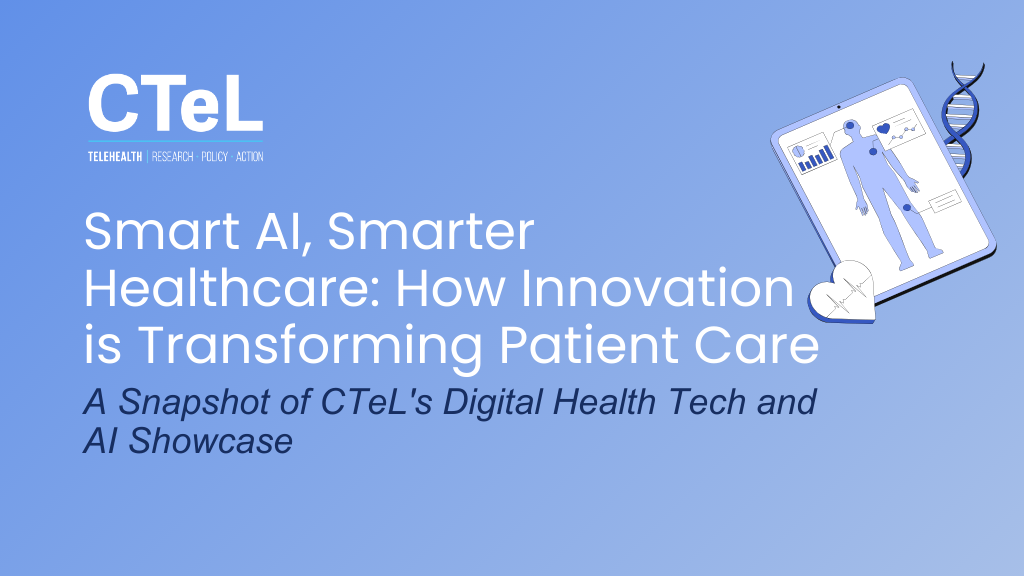Smart AI, Smarter Healthcare: How Innovation is Transforming Patient Care
On March 12, the Center for Telehealth and e-Health Law (CTeL) brought the future of healthcare straight to Capitol Hill. Nearly 30 vendors participated in CTeL’s Digital Health Tech and AI Showcase, presenting groundbreaking innovations to congressional staffers and emphasizing the urgent need for regulatory support to advance digital health and artificial intelligence (AI) in medicine. The event also honored key figures driving change, including Congresswoman Doris Matsui and Dr. Andrew Taylor, highlighting the growing support for responsible AI in healthcare.
A New Frontier in Emergency Medicine
Dr. Andrew Taylor, an emergency physician with UVA Health System and trailblazer in AI applications for healthcare, believes AI is already reshaping emergency care. “We’re focused on AI in triage, streamlining patient flow in emergency departments, and improving initial risk assessments,” he says. His work extends beyond the ER, leveraging AI for diagnostics and computational phenotyping to identify patient populations suited for specific treatments.
Despite the enthusiasm surrounding AI, concerns persist about whether these technologies will replace human healthcare providers. Dr. Taylor reassures that AI is not a substitute for doctors but an enhancement. “AI alone isn’t as effective as a human-AI partnership. The human element—lived experience, contextual understanding—will always be crucial,” he asserts.
Regulation remains a critical issue, particularly with AI-driven autonomous decision-making. “Who sets the goals for AI agents? Who regulates them?” Taylor asks. He advocates for governance structures that ensure AI remains aligned with healthcare objectives while safeguarding patients.
Revolutionizing Telehealth and Remote Care
For Civic Telehealth founders Joel Embry and Joe McMenamin, MD, JD , AI and digital health innovations are key to extending care beyond traditional settings. “Our goal is to help seniors live at home longer, healthier, and happier,” says Embry. By integrating remote patient monitoring and other digital tools, Civic Telehealth is bridging critical care gaps.
However, policy uncertainties create challenges. “The topsy-turvy nature of regulations makes long-term planning difficult,” McMenamin explains. He urges policymakers to provide stable legal frameworks that foster innovation and investment in telehealth solutions.
The sentiment is echoed by Matt Hall of Adjacent Health, which provides tele-neurology services. He sees AI as an indispensable triage tool, particularly for stroke patients. “Time is brain. AI helps us prioritize patients more efficiently, ensuring faster, life-saving interventions,” Hall emphasizes.
“Time is brain. AI helps us prioritize patients more efficiently, ensuring faster, life-saving interventions,” Hall emphasizes.
Ensuring Equitable Access and Support for Patients
Dr. Traci Sweet, Psy.D., MBA, CO-Founder of Holon Health, is tackling another pressing healthcare challenge—substance use disorder treatment. Her organization leverages telehealth to provide medication-assisted treatment (MAT) to patients who would otherwise struggle to access care. “Since telehealth expanded, we’ve seen significant success in getting Suboxone to patients safely and effectively,” she states. “We need policies that allow this to continue without unnecessary barriers.”
Kate Smith, a nurse and lactation consultant with Northwell Health, stresses the importance of keeping telehealth accessible for new mothers. “Many moms struggle to leave home after delivery. Telehealth provides crucial support when they need it most,” she explains. She calls for continued Medicare and insurance coverage to sustain these essential services.
“Many moms struggle to leave home after delivery. Telehealth provides crucial support when they need it most,” she explains.
AI: The Next Leap Forward
From mental health to emergency medicine, AI is at the forefront of healthcare transformation. Mark Noble, CEO of VitelNet, highlights AI’s role in telepsychiatry, reducing ER congestion by providing remote psychiatric evaluations. “With AI, we can get stroke patients the care they need faster. Every minute matters,” he says.
Dr. Thomas Kim of Noma Therapy is equally optimistic about AI’s potential in behavioral health. “AI and blockchain could reshape digital health, improving efficiency and accessibility,” he predicts. However, he cautions that ensuring responsible AI deployment is key: “Skynet is coming—but if we’re intentional, we can make AI work for us, not against us.”
“AI and blockchain could reshape digital health, improving efficiency and accessibility,” he predicts.
The Call for Smart Regulation and Policy Reform
The showcase underscored a unified message: innovation must be met with smart, proactive regulation. While AI and digital health tools hold immense promise, their success hinges on thoughtful policy frameworks that ensure safety, efficacy, and equitable access. CTeL is at the forefront of these efforts, actively working to shape policies that remove unnecessary barriers to digital health adoption while maintaining the highest standards of patient care.
CTeL advocates for policy reforms that ensure continued Medicare reimbursement for telehealth, support for AI integration in clinical workflows, and the elimination of outdated restrictions that limit access to quality care. Events like this showcase provide direct engagement with policymakers, fostering conversations that translate into real legislative action.
Congresswoman Doris Matsui, a longtime champion of digital health, was honored at the event for her commitment to advancing telehealth and AI-driven care solutions. Her work underscores the necessity of bipartisan efforts to modernize healthcare regulations, ensuring they keep pace with technological advancements.
As Dr. Taylor aptly puts it, “AI isn’t about replacing humans—it’s about augmenting them. With the right policies, we can build a future where AI enhances care, reduces costs, and ultimately improves patient outcomes.”
CTeL’s event made one thing clear: AI and digital health aren’t the future of medicine—they’re the present. Now, it’s up to policymakers to ensure they are deployed responsibly, safely, and equitably.
















